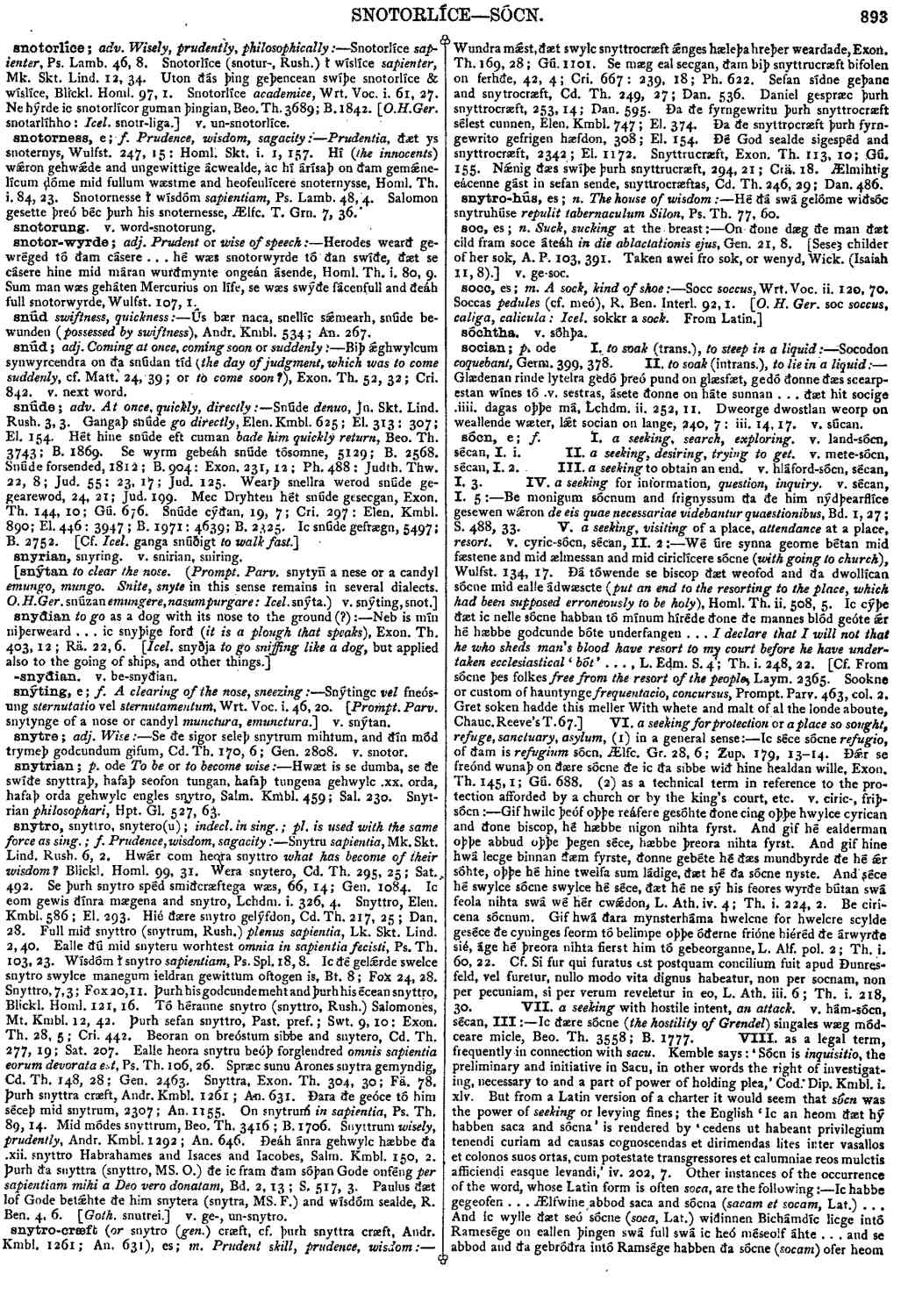sócn
- noun [ feminine ]
-
Be monigum sócnum and frignyssum ða ðe him nýdþearflíce gesewen wǽron
de eis quae necessariae videbantur quaestionibus,
- Bd. 1, 27; S. 488, 33.
with going to church
),- Wulfst. 134, 17.
Ðá tówende se biscop ðæt weofod and ða dwollícan sócne mid ealle ádwæscte (
put an end to the resorting to the place, which had been supposed erroneously to be holy),
- Homl. Th. ii. 508, 5.
Ic cýþe ðæt ic nelle sócne habban tó mínum híréde ðone ðe mannes blód geóte ǽr hé hæbbe godcunde bóte underfangen . . .
I declare that I will not that he who sheds man's blood have resort to my court before he have undertaken ecclesiastical 'bót' . . . , L. Edm. S. 4; Th. i. 248, 22. [Cf. From sócne þes folkes free from the resort of the people, )
- Laym. 2365.
Sookne or custom of hauntynge
frequentacio, concursus,
- Prompt. Parv. 463, col. 2.
Gret soken hadde this meller With whete and malt of al the londe aboute,
- Chauc.Reeve's T. 67.
-
Ic séce sócne refugio, of ðam is
refugium
sócn,- Ælfc. Gr. 28, 6; Zup. 179, 13-14.
-
Ðǽr se freónd wunaþ on ðære sócne ðe ic ða sibbe wið hine healdan wille,
- Exon. Th. 145, 1; Gú. 688.
-
Gif hwilc þeóf oþþe reáfere gesóhte ðone cing oþþe hwylce cyrican and ðone biscop, hé hæbbe nigon nihta fyrst. And gif hé ealderman oþþe abbud oþþe þegen séce, hæbbe þreora nihta fyrst. And gif hine hwá lecge binnan ðæm fyrste, ðonne gebéte hé ðæs mundbyrde ðe hé ǽr sóhte, oþþe hé hine twelfa sum ládige, ðæt hé ða sócne nyste. And séce hé swylce sócne swylce hé séce, ðæt hé ne sý his feores wyrðe bútan swá feola nihta swá wé hér cwǽdon,
- L. Ath. iv. 4; Th. i. 224, 2.
-
Be ciricena sócnum. Gif hwá ðara mynsterháma hwelcne for hwelcre scylde geséce ðe cyninges feorm tó belimpe oþþe óðerne frióne hiéréd ðe árwyrðe sié, áge hé þreora nihta fierst him tó gebeorganne,
- L. Alf. pol. 2; Th. i. 60, 22.
-
Cf. Si fur qui furatus est postquam concilium fuit apud Ðunres*-*feld, vel furetur, nullo modo vita dignus habeatur, non per socnam, non per pecuniam, si per verum reveletur in eo,
- L. Ath. iii. 6; Th. i. 218, 30.
the hostility of Grendel
) singales wæg mód*-*ceare micle,- Beo. Th. 3558; B. 1777.
- 202, 7.
-
Ic habbe gegeofen . . . Ælfwine abbod saca and sócna (
sacam et socam, Lat.) . . . And ic wylle ðæt seó sócne (soca, Lat.) wiðinnen Bichámdíc licge intó Ramesége on eallen þingen swá full swá ic heó méseolf áhte . . . and se abbod and ða gebróðra intó Ramsége habben ða sócne (socam )
ofer heom. . . And in ǽlcer[e] scíre ðǽr sanctus Benedictus hafþ land inne [habbe hé] his saca and his sócne . . . swá hwylc man swá ða sócne áhe, Sanctus Benedictus habbe his freódóm on eallen þingen, 208, 19-209, 14. - Mórtún and eal seó sócna ðe ðǽrtó héreþ, vi. 148, 36.
-
Ne gyrne ic ðínes ne sace ne sócne
I desire nothing of yours, neither your privileges nor your rights,
- L. O. 14; Th. i. 184, 16.
-
Cyninges þegenes heregeata ðe his sócne hæbbe,
- L. C. S. 72; Th. i. 414, 16.
-
Nán man náge náne sócne ofer cynges þegen búton cyng sylf,
- L. Eth. iii. 11; Th. i. 296, 23.
Bosworth, Joseph. “sócn.” In An Anglo-Saxon Dictionary Online, edited by Thomas Northcote Toller, Christ Sean, and Ondřej Tichy. Prague: Faculty of Arts, Charles University, 2014. https://bosworthtoller.com/28277.
Checked: 0